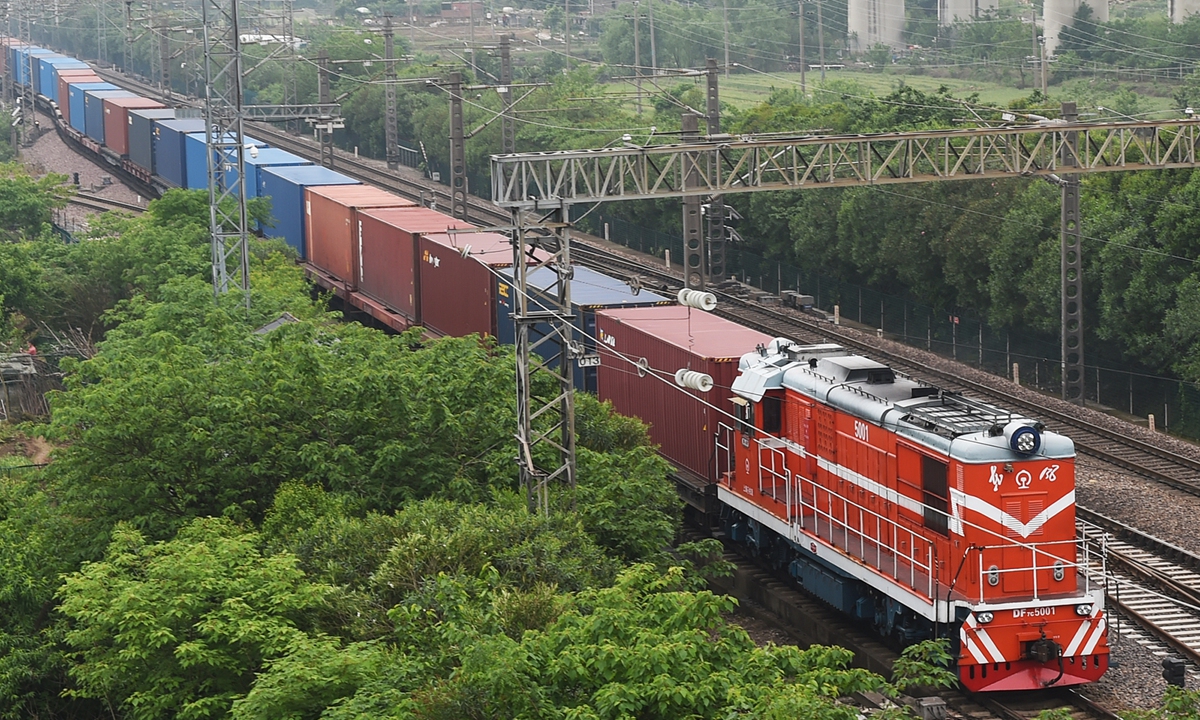
The 500th “Yiwu-Xinjiang-Europe” China-Europe freight train departed from Yiwu in East China’s Zhejiang Province bound for Madrid, Spain on May 1, 2022. Photo: VCG
As Yiwu in East China's Zhejiang Province, often dubbed the world's supermarket or the world's small commodity capital, entered the first day of a three-day "static management" due to COVID-19, local businesses said that they have seen certain disruptions, but the impact remains limited so far.
The city announced on Wednesday night that it would impose "static management" from Thursday to Saturday to stem a new outbreak of COVID-19.
Under the anti-epidemic rules, residents must stay in their neighborhoods or homes, while enterprises are asked to halt production and operation except for certain firms like those on a "white list" and key logistics companies.
Several sources told the Global Times that the Yiwu International Trade City, which is home to the world's largest wholesale market, has also been closed.
Before Thursday, the market was running normally, but many booth owners had already chosen to work from home since August 3 because there were very few visitors, Chen Lixiu, a handbag vendor in the facility, told the Global Times on Thursday.
Some businesses also said that their operations have been impacted to a certain extend. Logistics is a big problem, as several vendors said that product deliveries were delayed due to the epidemic, though the impact of such delays is hard to calculate now.
Cai Qinliang, secretary-general of the Industry Association of Christmas Supplies in Yiwu, told the Global Times that the outbreak and the subsequent anti-epidemic move would affect the logistics of Christmas products in Yiwu.
According to him, production had finished for many Christmas goods and they're concentrated in Yiwu, ready to be shipped to Ningbo-Zhoushan Port in containers for export, but now they're trapped temporarily.
"Christmas products are seasonal products, and both buyers and sellers want the goods to reach their destinations as soon as possible," said Cai, noting that it takes about two months for those goods to arrive in South America by sea, so "time is actually tight."
Wang Hanyu, owner of an invitation card factory in Yiwu and also Wenzhou, faced a similar problem. Some of his products are stuck in Yiwu's logistics transfer center waiting for loading, which has disrupted his shipment plans.
"This leads to two problems. One, there's pressure from extra storage time and costs. Second, shipment delays also affect subsequent orders," he told the Global Times on Thursday.
Production is also an issue. Wang said his factory has halted production for about a week.
The Yiwu city government has launched measures to maintain key enterprises' production and logistics amid the anti-epidemic measures.
A Yiwu official said during a press conference on Sunday that Yiwu sent 22 Yiwu-Xinjiang-Europe special freight trains between August 2 and Saturday, while cargo flights between Yiwu and Osaka, Japan also operated normally.
The Yiwu-Ningbo-Zhoushan Port combined sea-rail intermodal transport continued normal operations, a staffer at the Yiwu Landport Railway Port Development Co told the Global Times on Thursday.
In terms of production support, the local government has taken measures such as setting up a white list to let key enterprises continue production, arranging nucleic acid test sites for certain enterprises, and setting a closed-loop production plan for key industrial enterprises, the official noted.
Several local businesses said that although operations have been disrupted, the impact was still limited.
"We counted on old customers basically in the past two years. But this year, because many overseas markets eased COVID-19 lockdown measures, we have many orders flooding in," Chen said, adding that since her factory is located outside of Yiwu, production is going normally now.
Zhang Jiying, a veteran umbrella vendor in Yiwu, told the Global Times that her business revenues were basically steady in the past three years, as customers mostly shifted to online platforms like email or WeChat to place orders.
According to Zhang, it's now the shipment season for umbrella products, and her deliveries are delayed. But she said her clients expressed understanding of the situation, and she was confident that logistics would become normal soon once the epidemic is brought under effective control.




